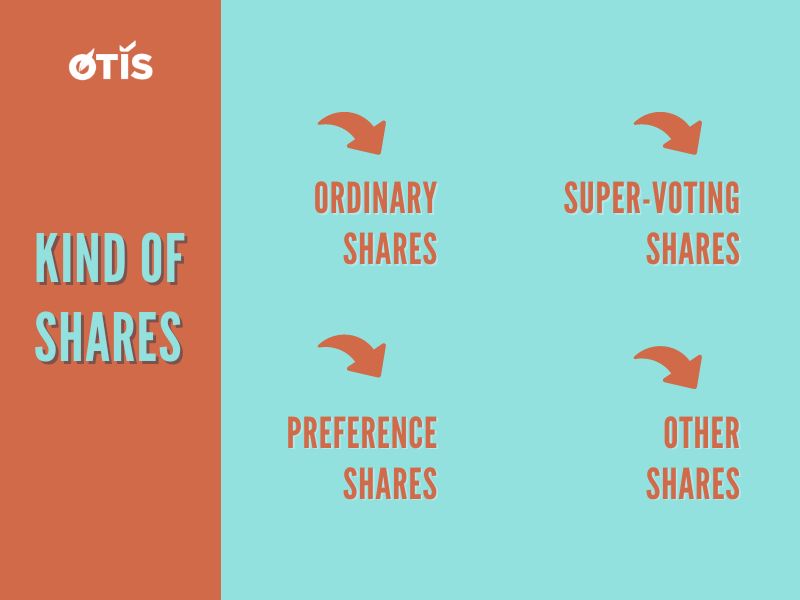What are shares? What types of shares are there? Who are shareholders? What are the rights and obligations of shareholders? Let’s find out in the article below of OTIS LAWYERS to answer your questions.
Legal ground
Law No. 59/2020/QH14 dated June 17, 2022 on Enterprises
What are shares?
Point a Clause 1, Article 111, Enterprise Law 2020, stipulates that the charter capital is divided into units of equal value called shares.
Individuals or organizations that own shares are called shareholders. Accordingly:
– The value of each share (share par value) is decided by the company and recorded in the stocks. The par value of the shares may differ from the offering price of the shares.
– Shares are the legal basis to prove the company’s shareholder status.
What kind of shares are there?
Ordinary shares
A joint stock company shall have ordinary shares, which ordinary shareholders hold.
Preference shares

In addition to ordinary shares, a joint stock company may have preference shares. Owners of preferred shares are called preferred shareholders. Preference shares include the following types:
Participating preference shares
Participating preference shares are shares that provide their holders with higher dividends than those of ordinary shares or with the stable annual dividend. Annual dividend includes fixed dividend and extra dividend. Fix dividends do not depend on the company’s business performance. Fix dividend and method for determination of extra dividend shall be written on the certificates of participating preference shares.
Redeemable preferred shares
Redeemable preference shares are shares that will be redeemed by the company at the request of their holders or under the conditions written in the certificates of redeemable preference shares and the company’s charter.
Super-voting shares
Super-voting shares are ordinary shares that have more votes than other ordinary shares. The number of votes of a preferred voting share shall be specified in the company’s charter. Only organizations authorized by the Government and founding shareholders may hold super-voting shares.
Other preferred shares as prescribed in the company’s charter and the law on securities.
Noted:
– The persons that may purchase participating preference shares, redeemable preference shares and other preference shares shall be specified in the company’s charter or decided by the GMS.
– Every share of the same type will confer upon the holder equal rights, obligations and interest.
– Ordinary shares can not be converted into preference shares. preference shares may be converted into ordinary shares under a resolution of the GMS.
– Ordinary shares used as underlying assets to issue non-voting depository receipts are called underlying ordinary shares. Non-voting depository receipts have interest and obligations proportional to the underlying ordinary shares, except voting rights.
Rights of Ordinary shareholders
Ordinary shareholders have the right to:
– Participate in and make comments at the General Meeting of Shareholders (GMS); exercise the right to vote directly or through authorized representatives or another method prescribed by law or the company’s charter. Each ordinary share equals one vote;
– Receives dividends at the rate decided by the GMS;
– Be given priority to buy additional shares in proportion to their holding of ordinary shares in the company;
– Transfer their shares to other persons except for the cases specified in Clause 3 Article 120 and Clause 1 Article 127 of this Law and relevant laws;
– Access names and addresses on the list of voting shareholders; request rectification of incorrect information about themselves;
– Access, extract, make copies of the company’s charter, minutes and resolutions of the GMS;
– Receive part of the remaining assets in proportion to their holdings in the company when the company is dissolved or goes bankrupt.
Rights of preferred stockholders
Rights of voting preference shares holders
– Vote on the matters under the jurisdiction of the GMS with the number of votes specified in Clause 1 of this Article;
– Other rights of ordinary shareholders, except the cases specified in Clause 3 of Article 116 of the Law on Enterprises 2020
Rights of Participating preference shares holders
– Receive the dividend
– Receive part of the company’s remaining assets in proportion to their holdings in case the company is dissolved or goes bankrupt after the company’s debts and redeemable preference shares are fully paid;
– Other rights as common shareholders, except for the case specified in Clause 3, Article 117 of the Enterprise Law 2020
Rights of redeemable preferred shares holders
Holders of redeemable preference shares have all of the rights of ordinary shareholders, but not have the right to vote, participate in the GMS, nominate candidates for the Board of Directors and the Board of Controllers, except the cases specified in Clause 5 Article 114 and Clause 6 Article 148 of this Law.
Obligations of Shareholders
Article 119, Enterprise Law 2020 stipulates that the obligations of shareholders as follows:
– Fully and punctually pay for their subscribed shares;
– Do not withdraw contributed capital in the form of ordinary shares in any shape or form, unless the shares are purchased by the company or other persons. The shareholder that withdraws all or part of the share capital against regulations of this Clause and persons with related interests in the company shall have a liability for the company’s debts and other liabilities which is equal to the value of the shares withdrawn and the damage caused by this action.
– Comply with the company’s charter, rules and regulations;
– Comply with resolutions and decisions of the Board of Directors and the GMS.
– Protect the confidentiality of information provided by the company in accordance with the company’s charter and the law; only use the provided information to perform and protect their lawful rights and interests; do not spread or share information provided by the company to any other organization or individual.
– Other obligations prescribed by Law and the company’s charter.
Above is our advice on the question of what shares are in general and shareholders in joint stock companies in particular. We believe this will be a useful source for readers who want to find out the provisions of the law on the business.
Business consulting services of OTIS LAWYERS

OTIS LAWYERS are always proud to be a professional unit in the field of business consulting. A team of highly qualified lawyers with extensive experience and dedication to clients, we will provide clients with the best service, the most professional, reasonable cost and the fastest time to complete the procedure. We commit that all client information is absolutely confidential and client interests always come first.
For any questions or comments, please contact:
OTIS AND PARTNERS LAW FIRM
Office address: K28 – Group K, Lane 68 Trung Kinh, Yen Hoa Ward, Cau Giay District, Hanoi
Email: info@otislawyers.vn
Hotline: 0987748111


 Tiếng Việt
Tiếng Việt 한국어
한국어 中文 (中国)
中文 (中国)